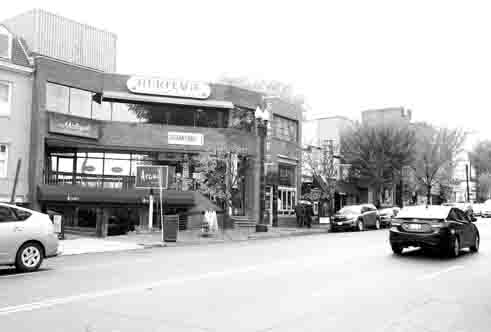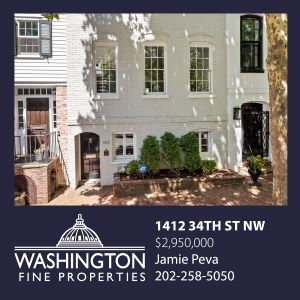Caps on Restaurant Licenses Under Review in Glover Park, Georgetown

By Mark LiebermanCurrent Staff Writer
When the D.C. Alcoholic Beverage Control Board implemented a cap on liquor licenses in the Glover Park neighborhood in 1999, area residents were solidly behind the idea. But after a decade and a half, the character of the neighborhood has changed, and with it, both the demographics of consumers and goals of business owners.
Likewise, a similar moratorium from 1989 in Georgetown is increasingly drawing ire from the business community, which wants to focus on restoring luster to one of the city’s key destination neighborhoods.
These moratoriums periodically come up for renewal, with the alcohol board often voting to continue them based on the recommendations of the local advisory neighborhood commission and other community organizations. The Glover Park moratorium was last altered in 2012, when the board members continued to ban licenses for taverns and nightclubs while permitting licenses for liquor stores and grocery stores. The rule also places a limit of 14 restaurant licenses in the neighborhood.
The Georgetown moratorium also prohibits new licenses for taverns and nightclubs, and it caps the number of restaurant licenses in the neighborhood at 68.
Both moratoriums will expire in February unless the alcohol board opts to renew or alter them.
The Glover Park neighborhood commission will discuss the issue at Thursday’s meeting and vote on Nov. 12. If the commission adopts its current proposal, it will recommend ending the limit on the number of restaurant licenses while keeping the ban on additional taverns and nightclubs intact, according to chair Jackie Blumenthal.
Meanwhile, the Georgetown community is wrestling with the best approach to balancing the goals and desires of businesses and residents. The Georgetown Business Improvement District has issued an extensive white paper advocating for the elimination of the moratorium altogether, while some neighborhood commissioners think it needs to remain in place with some alterations.
The business group says it observes other neighborhoods encroaching on Georgetown’s territory as a result of the limitation on the number of new restaurants. According to CEO and president Joe Sternlieb, his organization’s board of directors is willing to compromise on the terms of a new moratorium, but only with an eye toward reaching consensus on solving the problems he believes the current limits cause.
“We’re trying to take a little bit of the passion out of it and look at it from an economic, regulatory and practical standpoint,” Sternlieb said.
Georgetown neighborhood commissioner Bill Starrels thinks eliminating the moratorium entirely would create chaos. He’s proposing instead that the alcohol board approve the possibility for a set number of restricted restaurant licenses on top of the 68 regular restaurant licenses currently permitted. The restricted licenses would place limits on alcohol sales after midnight and prevent restaurants from hosting events with amplified entertainment.
“It can get very uncomfortable and undesirable for the neighborhood and the immediate residents,” Starrels said of late-night operations and amplified noise.
Sternlieb said he likes the idea of restricted restaurant licenses, but he’s talked to numerous business owners who would go elsewhere if that were their only option because the rules would hurt their sales. The possibility of discouraging interested business owners doesn’t appeal to Sternlieb or his team.
“We’re under-restauranted,” Sternlieb said. “People don’t make plans to spend a day or an evening in Georgetown because there’s not enough of a critical mass of restaurants. We could use a stronger mix.”
Despite the concerns, Starrels says lifting the moratorium is unnecessary to allow future growth, given that 16 restaurant licenses are currently in safekeeping — meaning that they were temporarily discontinued and could be reactivated.
Starrels said he’d rather see the alcohol administration change its “first-come, first-served” policy regarding applicants for available licenses once they’re removed from safekeeping. Currently, prospective applicants often wait outside the alcohol administration’s office all night in order to be among the first to submit their applications, he said.
In Glover Park, Blumenthal said the limit on restaurant licenses originally came about because of concerns that nightlife businesses would take over the neighborhood-serving commercial corridor. But at this point, Blumenthal thinks the demand has slowed to the extent that a codified limit on restaurants is no longer necessary. One of the 14 available licenses hasn’t even been claimed since the last alteration to the moratorium in 2012, Blumenthal said. “There’s clearly not going to be a problem with allowing more restaurants here,” Blumenthal said. “They’re not going to take over the commercial center or unbalance the goods and services.”
Blumenthal said the purpose of the moratorium is for the neighborhood to take control of a potential problem. In this case, she said, the potential problem with noise and disruption persists with taverns and nightclubs, not restaurants.
“There’s a lot of support from the neighborhood in encouraging more restaurants,” Blumenthal said. “We feel that, no matter how many restaurants we have, food service with alcohol is not going to be a problem for the neighborhood.”
This article appears in the Oct. 7 issue of The Georgetown Current newspaper.





